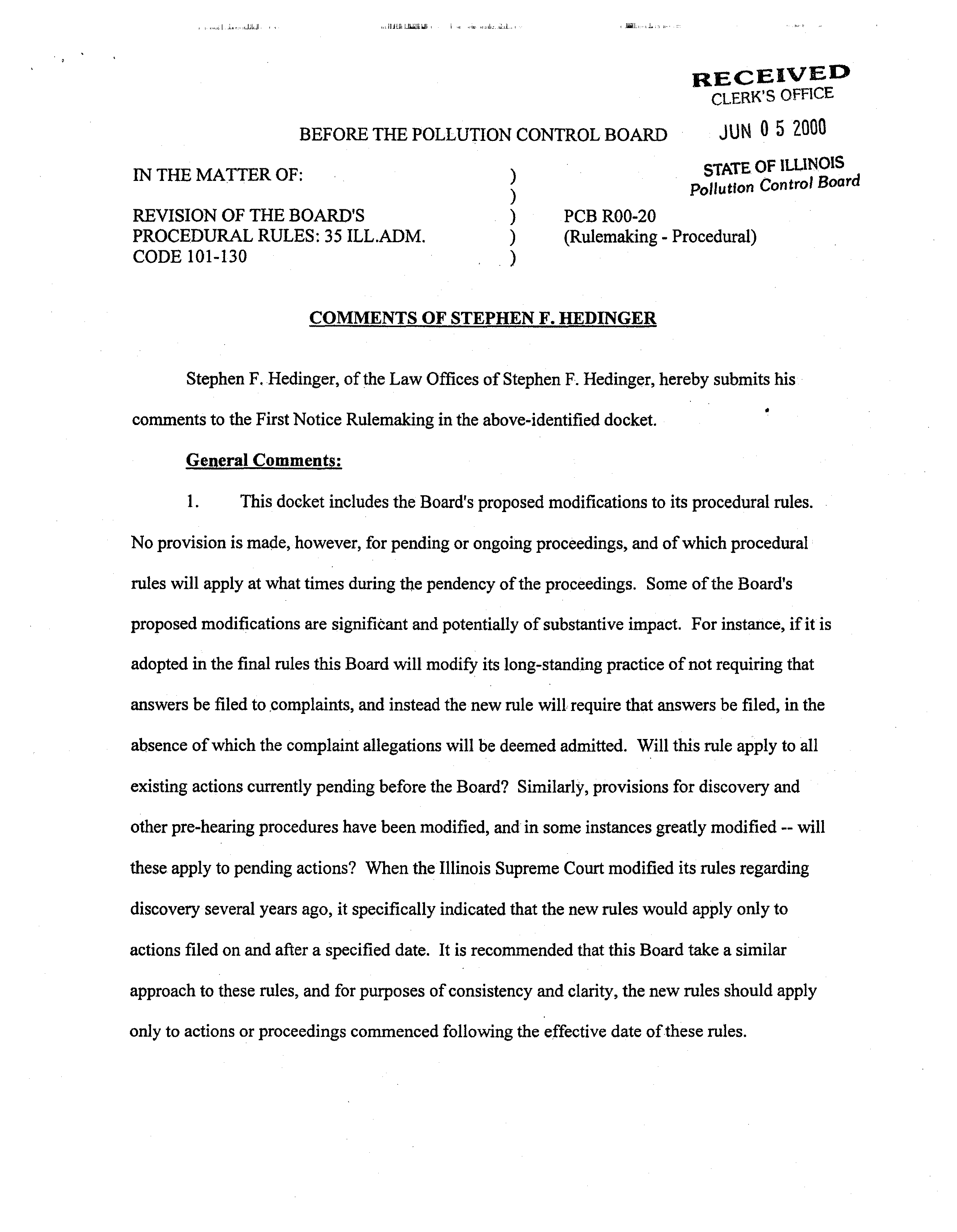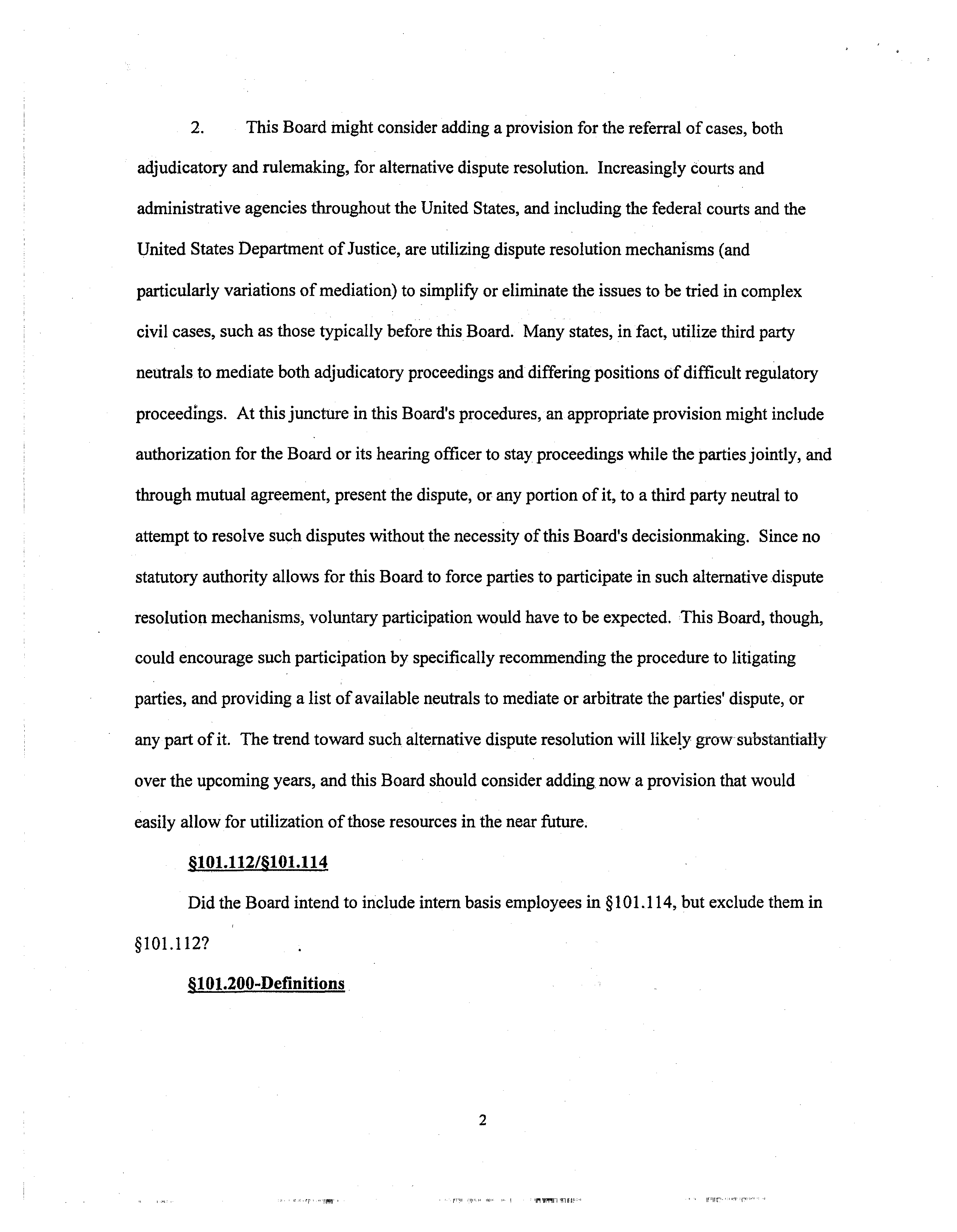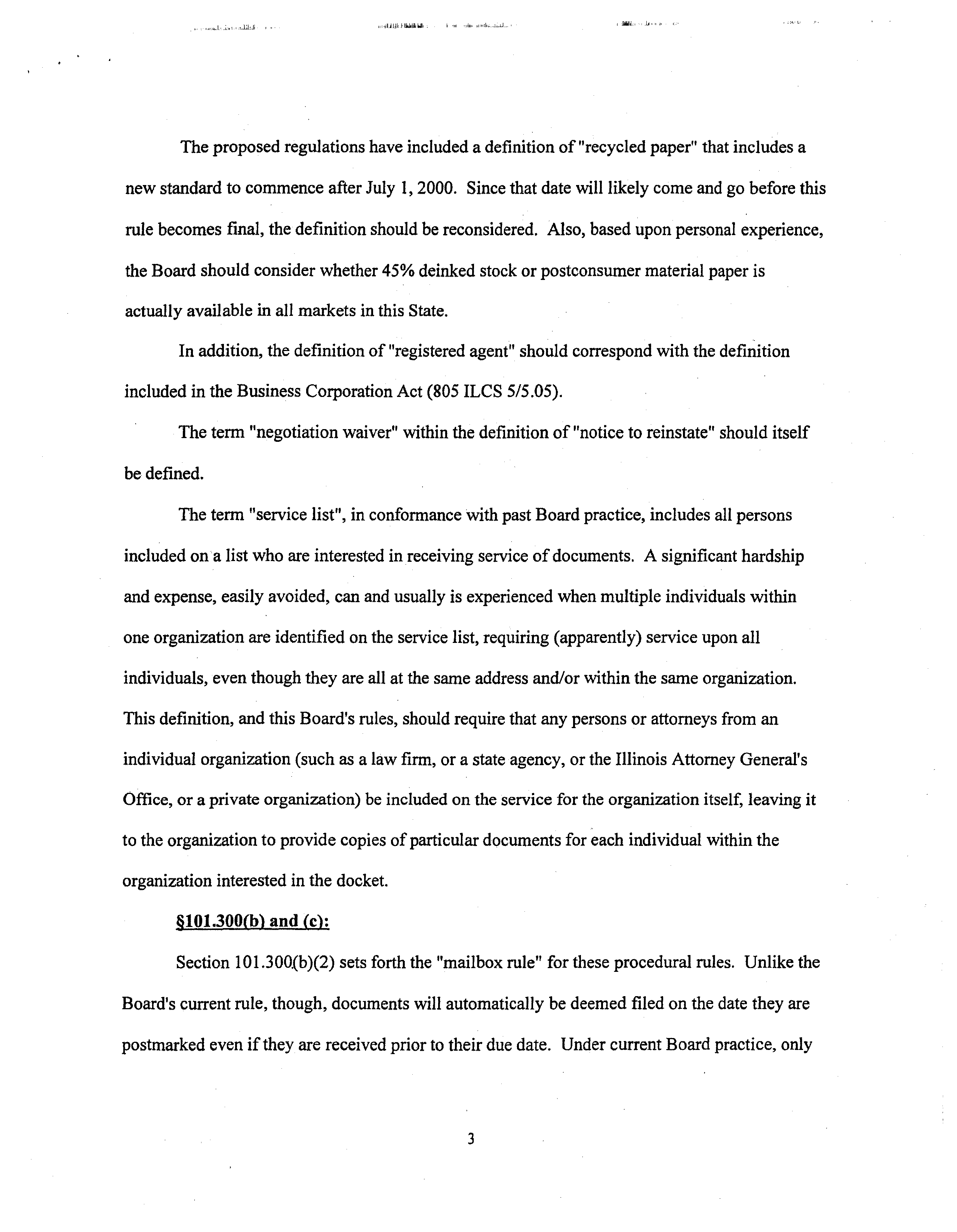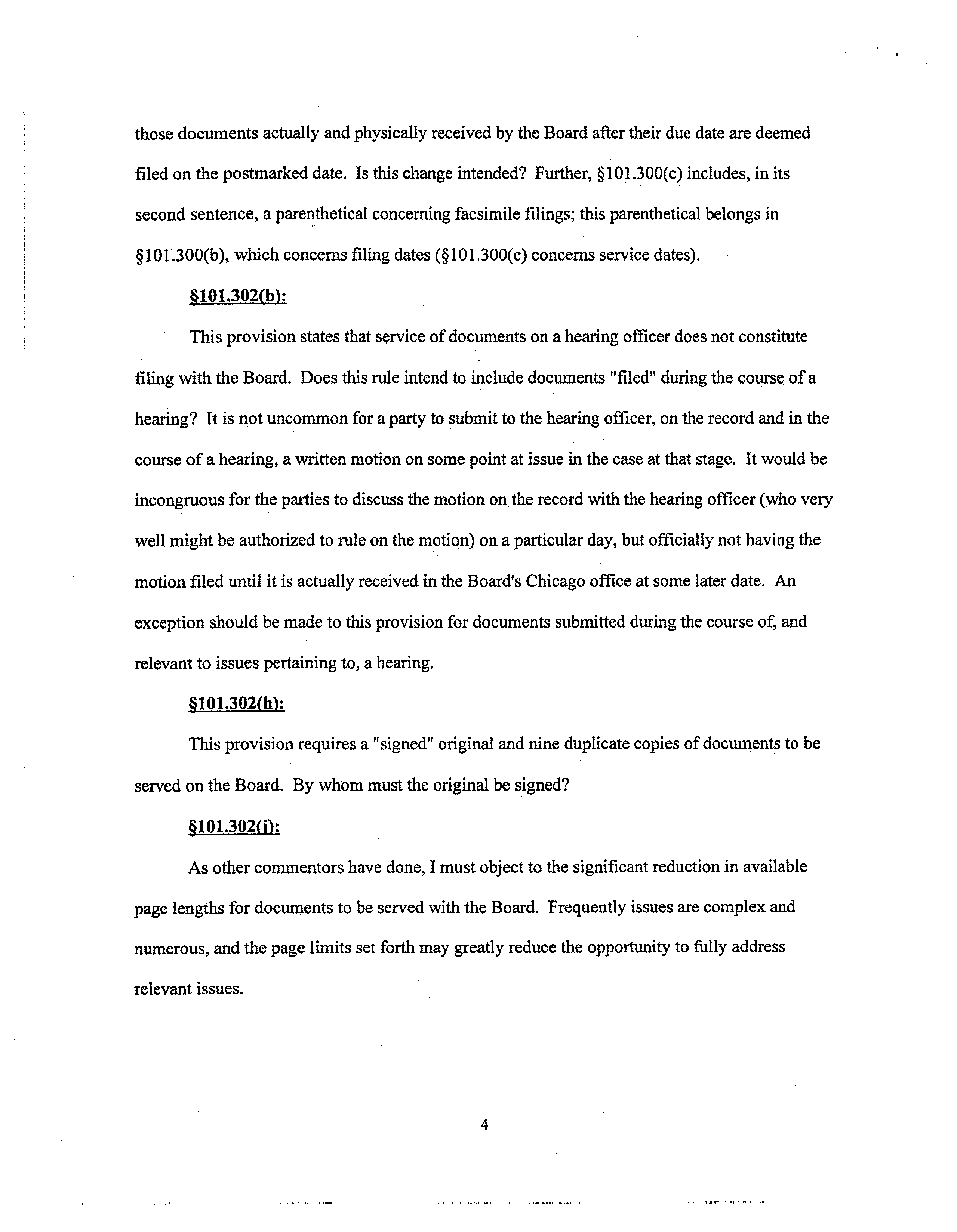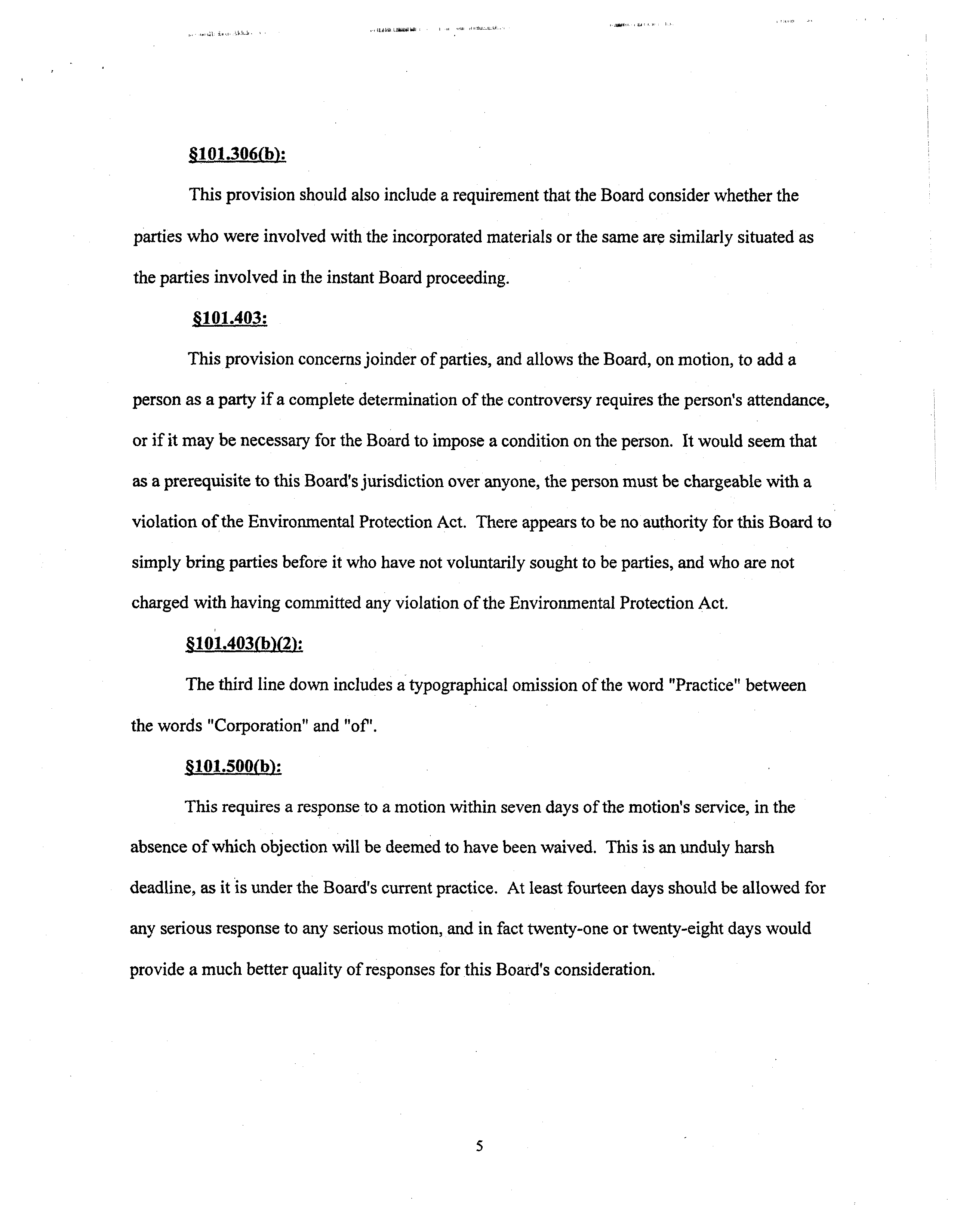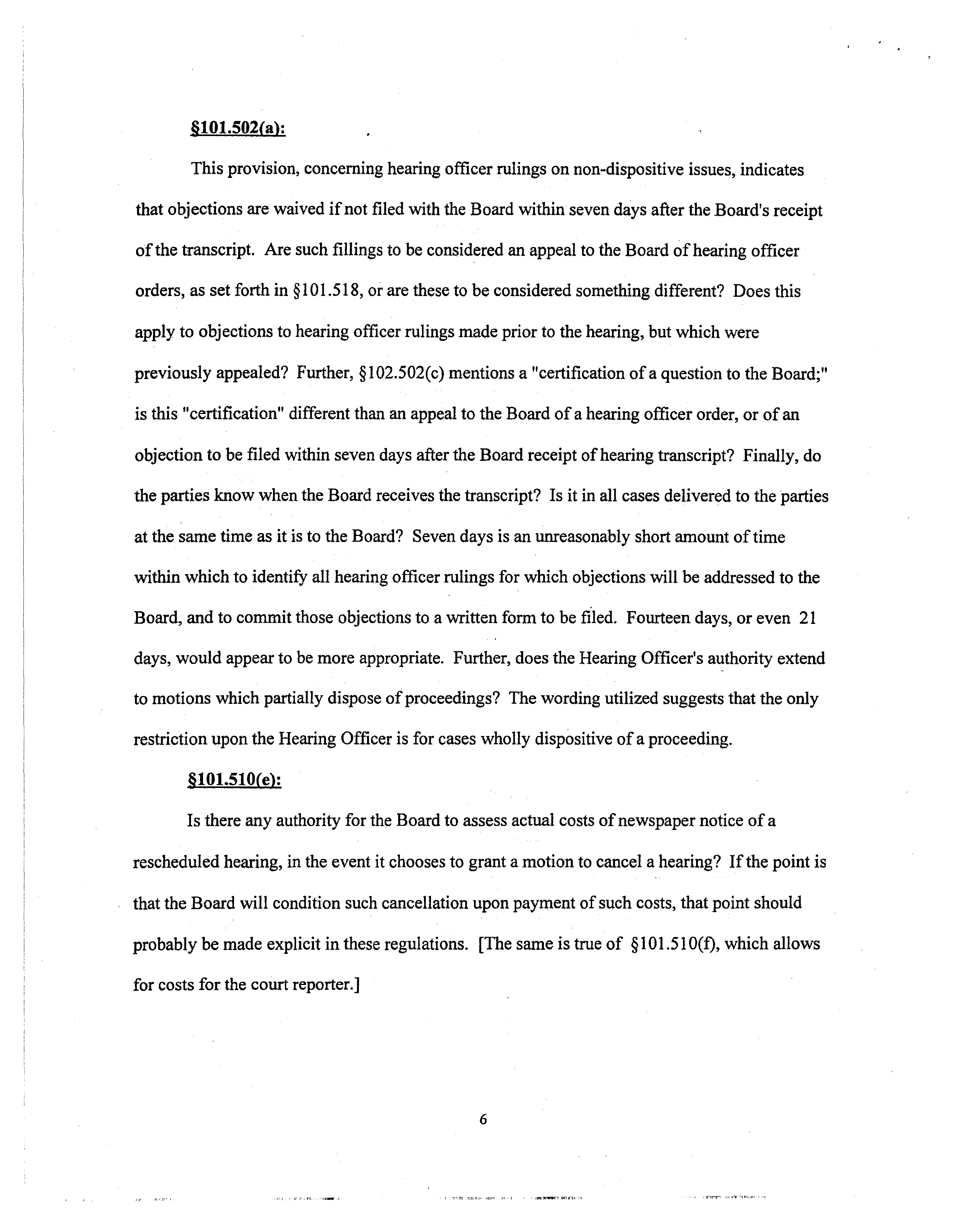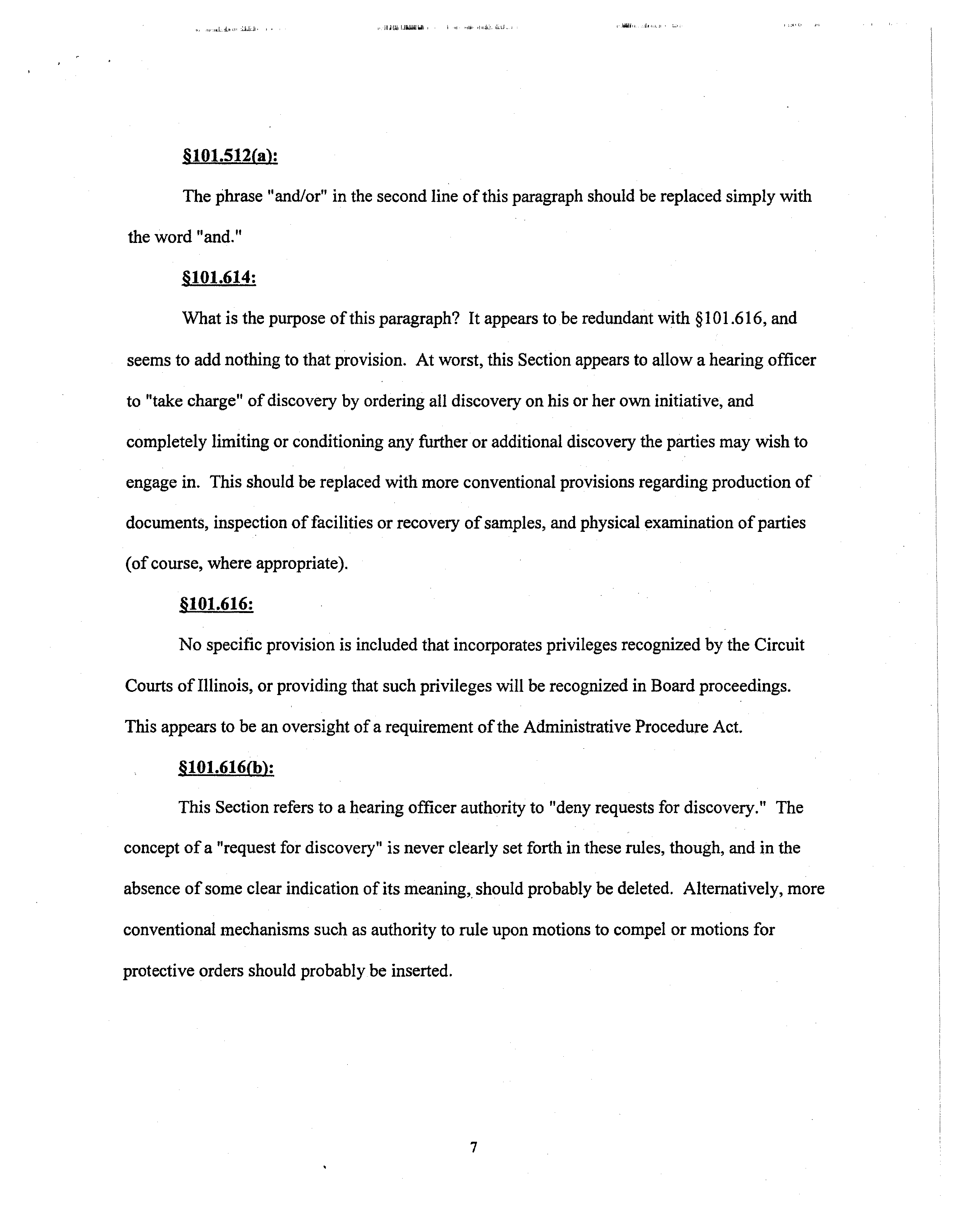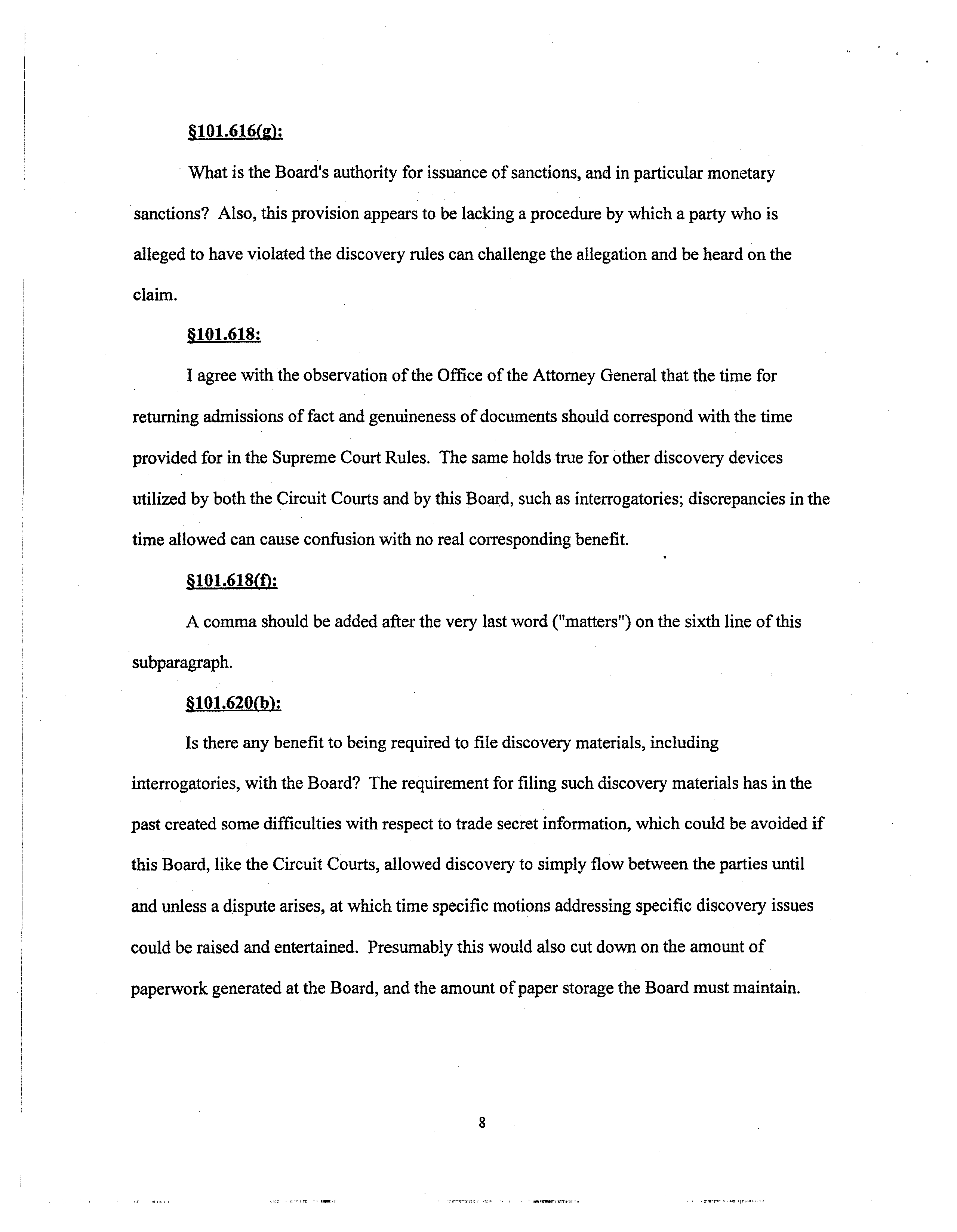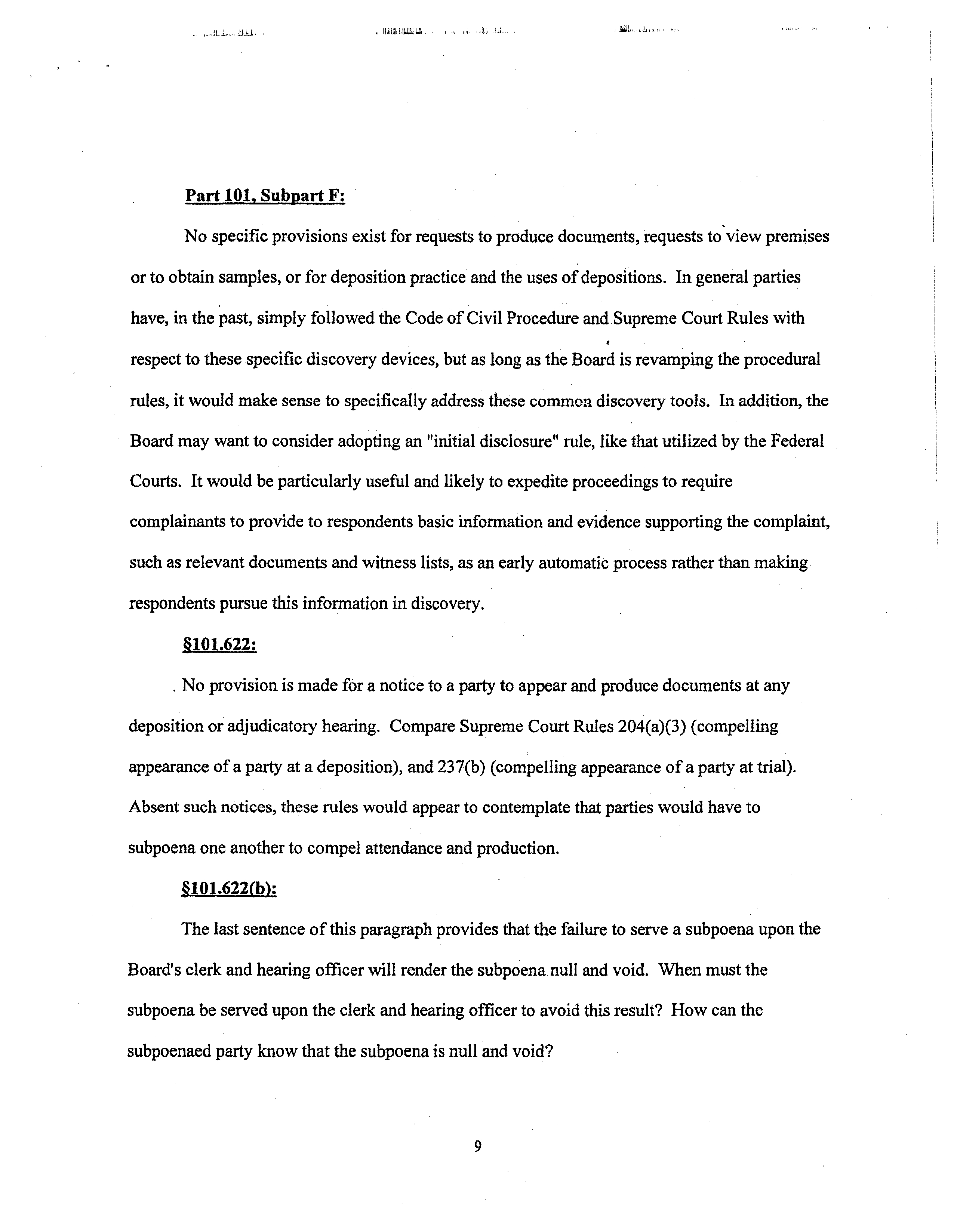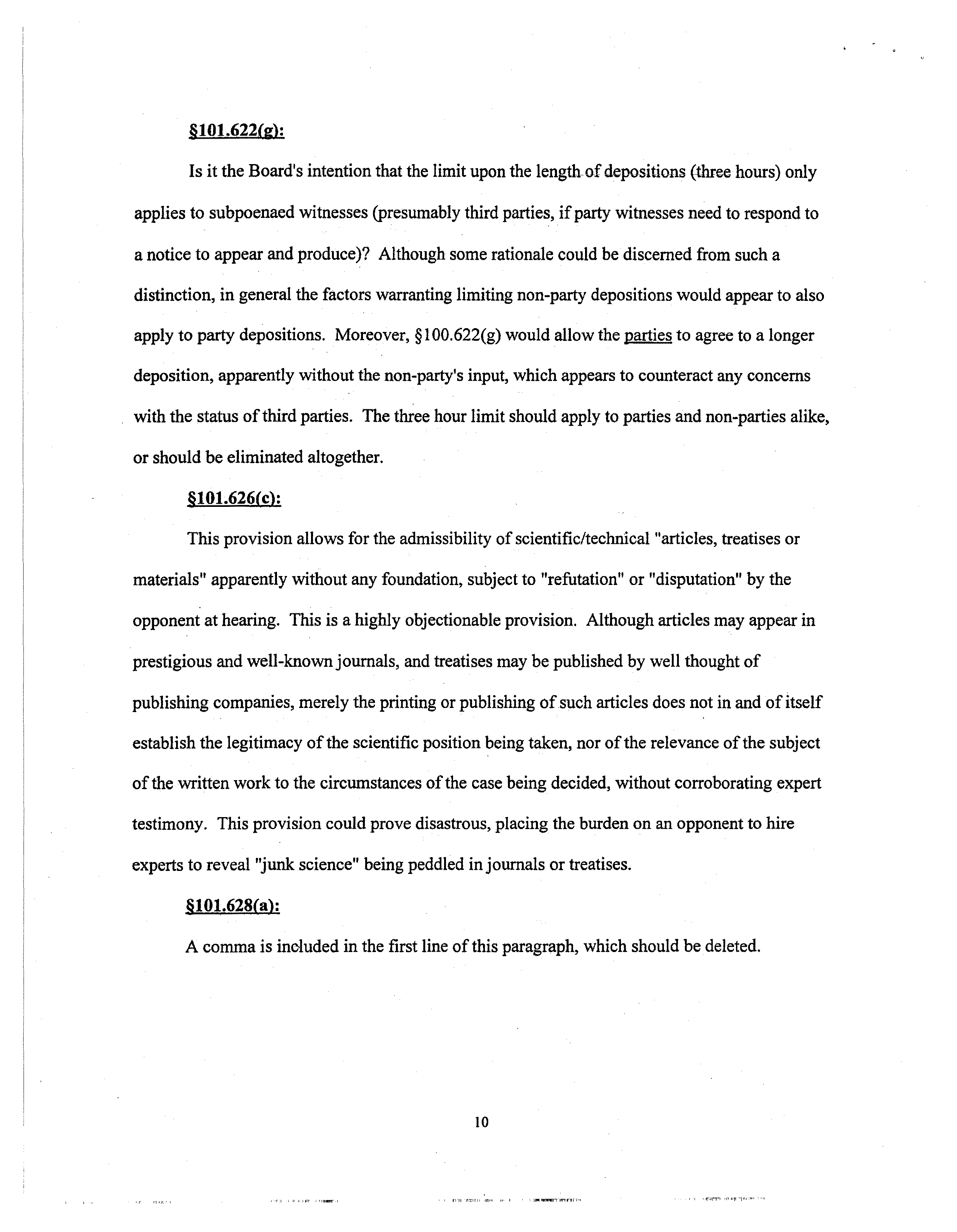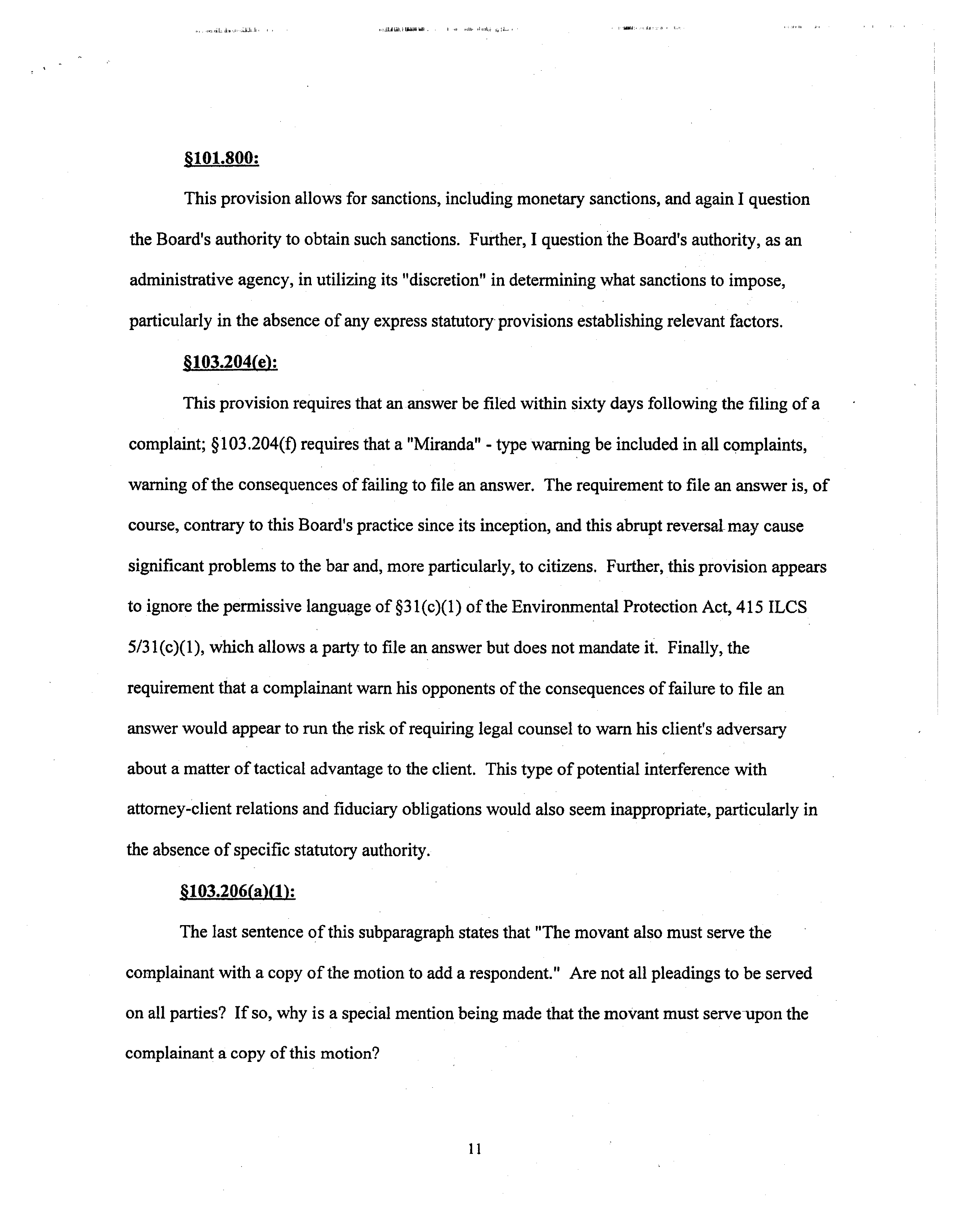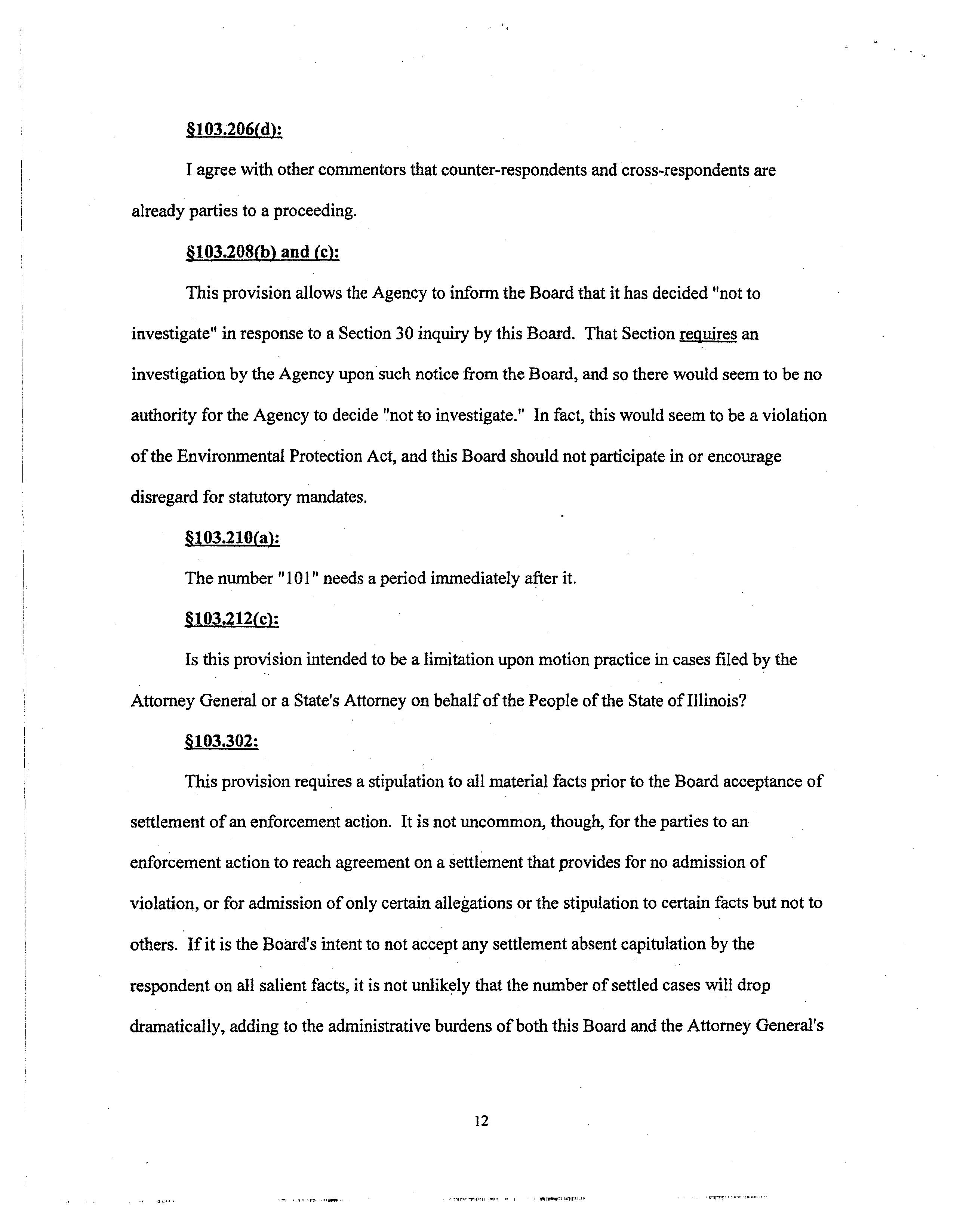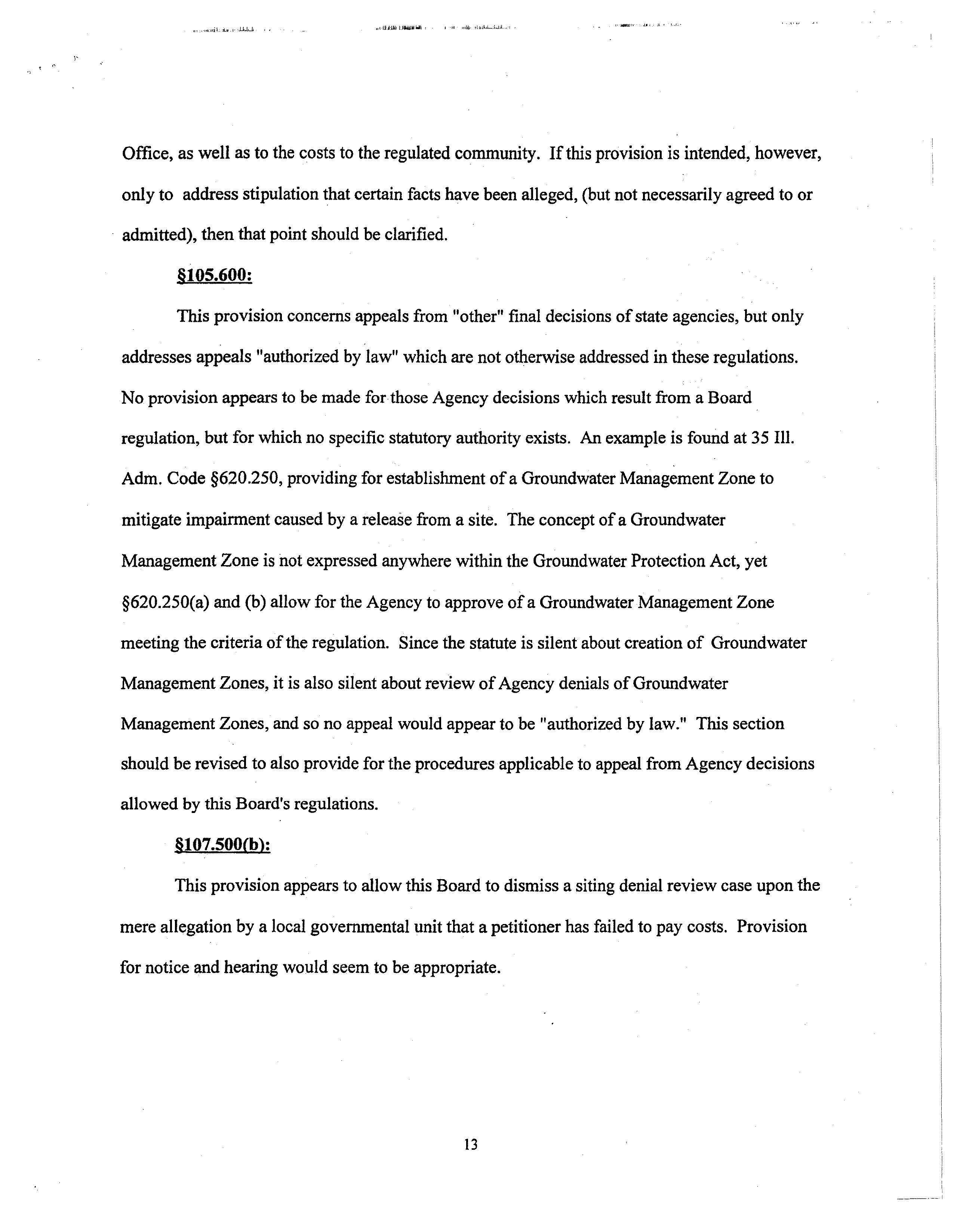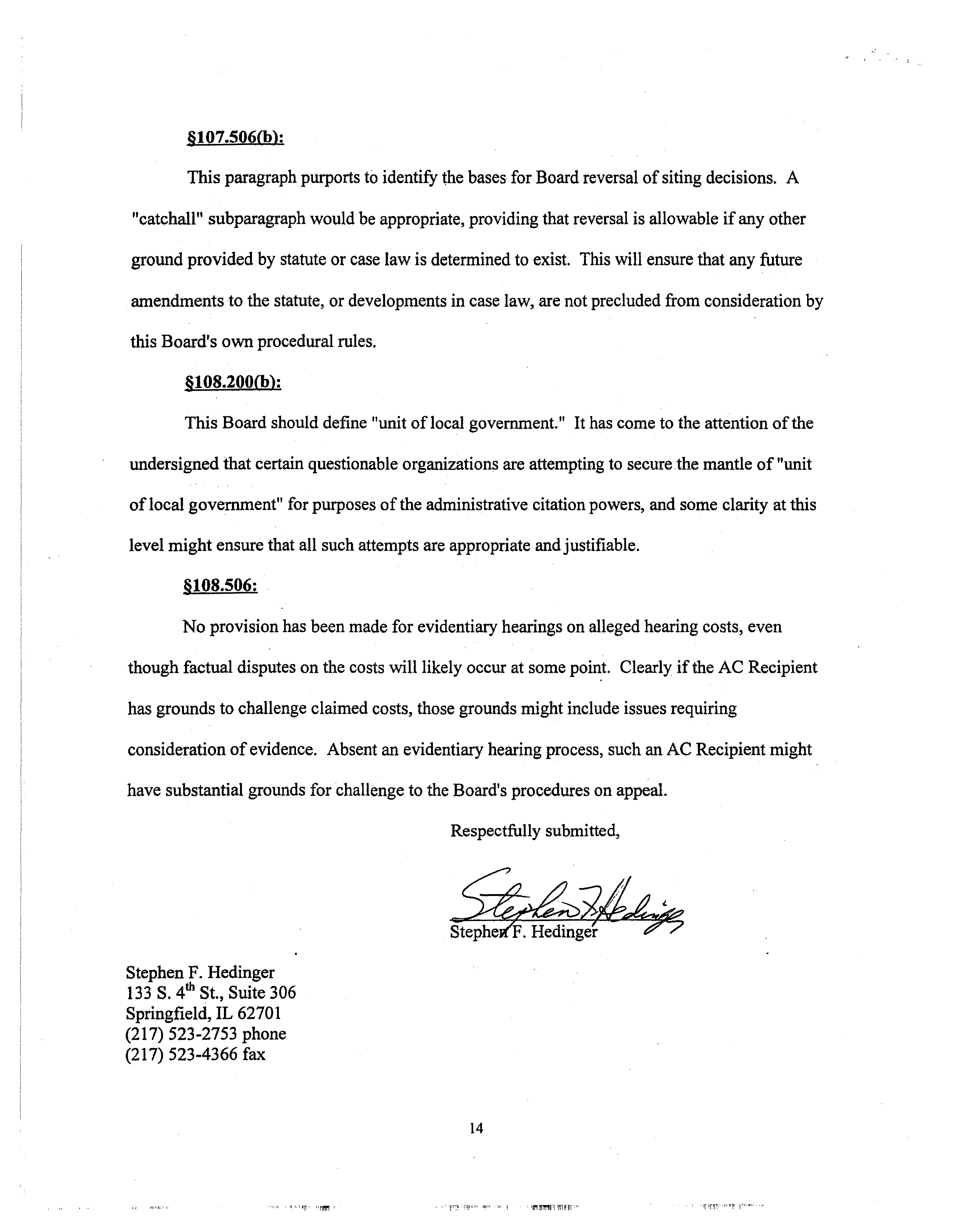~li~LL~
RECEIVED
CLERK’S
OFFICE
BEFORE THE POLLUTION CONTROL BOARD
JUN
052000
IN THE MATTER OF:
)
STATE OF ILLINOIS d
)
pollution Control Boar
REVISION OF THE
BOARD’S
)
PCB
R00-20
PROCEDURAL RULES:
35
ILL.ADM.
)
(Rulemaking
-
Procedural)
CODE 101-130
)
COMMENTS
OF
STEPHEN F.
HEDINGER
Stephen F. Hedinger, ofthe Law Offices of Stephen F. Hedinger, hereby submits his
comments to the First Notice Rulemaking in the above-identified docket.
General Comments:
1.
This docket includes the Board’s proposed modifications to its procedural rules.
No provision is made, however, for pending or ongoing proceedings, and ofwhich procedural
rules will apply at what times during the pendency ofthe proceedings.
Some ofthe Board’s
proposed modifications are significant and potentially of substantive impact.
For instance, if it is
adopted in the final rules this Board will modify its long-standing practice ofnot requiring that
answers be filed to complaints, and instead the new rule will require that answers be filed, in the
absence ofwhich the complaint allegations will
be deemed admitted.
Will this rule apply to all
existing actions currently pending before the Board?
Similarly, provisions for discovery and
other pre-hearing procedures have been modified,
and in some instances greatly modified
--
will
these apply to pending actions?
When the Illinois Supreme Court modified its rules regarding
discovery several years ago, it specifically indicatedthat the newrules would apply only to
actions filed on and after a specified date.
It is recommended that this Board take a similar
approach to
these rules, and for purposes ofconsistency and clarity, the new rules should apply
only to actions or proceedings commenced following the effective date ofthese rules.
2.
This Board might consider adding a provision forthe referral ofcases, both
adjudicatory and rulemaking, for alternative dispute resolution.
Increasingly courts and
administrative agencies throughoutthe United States, and includingthe federal courts and the
United States Department ofJustice, are utilizing dispute resolution mechanisms (and
particularly variations ofmediation) to simplify or eliminate the issues to
be tried in complex
civil cases, such as those typically before this Board.
Many states,
in fact, utilize thirdparty
neutrals to mediate both adjudicatory proceedings and differingpositions of difficult regulatory
proceedings.
At this juncture in this Board’s procedures, an appropriate provision might include
authorization for the Board or its hearing officer to stay proceedings while the partiesjointly,
and
through mutual agreement, present thedispute, or any portion ofit, to a thirdparty neutral to
attempt to resolve such disputes without thenecessity ofthis Board’s decisionmaking.
Since no
statutory authority allows for this Board to force parties to participate in such alternative dispute
resolution mechanisms, voluntary participation would have to be expected.
‘This Board, though,
could encourage suchparticipation by specifically recommending the procedure to litigating
parties, and providing a list ofavailable neutrals to mediate or arbitrate the parties’ dispute, or
any part ofit.
The trend toward such alternative dispute resolution will likely growsubstantiatly
over the upcoming years, and this Board should consider adding, now a provision that would
easily allow for utilization ofthose resources in the near future.
~1O1.112/~1O1.114
Did the Board intend to
include intern basis employees in
§
101.114, but exclude them in
§101.112?
~1O1.2OO-Definitions
2
The proposed regulations have included a definition of “recycled paper” that includes a
new standard to commence after July
1, 2000.
Since that date will likely come and go before this
rule becomes final, the definition should be reconsidered.
Also, based upon personal experience,
the Board should consider whether
45
deinked stock orpostconsumer material paper is
actually available in all markets in this State.
In addition, the definition of “registered agent”
should correspond with the definition
included in the Business Corporation Act
(805
ILCS
5/5.05).
The term “negotiation waiver” withinthe definition of“notice to reinstate” should itself
be defined.
Theterm “service list”, in conformance with past Board practice, includes all persons
included on a list who are interested in receiving service of documents.
A significant hardship
and expense, easily avoided, can and usually is experienced when multiple individuals within
one organization are identified on the service list, requiring (apparently) service upon all
individuals, even though they areall at the same address and/or within the same organization.
This definition, and this Board’s rules, should require that any persons or attorneys from an
individual organization (such as a law firm, or a state agency, or the Illinois Attorney General’s
Office, or a private organization) be included on the service forthe organization itself, leaving it
to the organization to provide copies ofparticular documents for each individual withinthe
organization interested in the docket.
§1OI.300(bI and (ci:
Section
101 .300~b)(2)
sets forth the “mailbox rule” forthese procedural rules.
Unlike the
Board’s current rule, though, documents will automatically be deemed filed on the date they are
postmarked even if they are received prior to their due date.
Under currentBoard practice, only
3
those documents actually and physically received by the Board after their due date are deemed
filed on the postmarked date.
Is this change intended?
Further,
§
101.300(c) includes, in its
second sentence, a parenthetical concerning facsimile filings; this parenthetical belongs in
§
101.300(b), which concerns filing dates
(~
101.300(c) concerns service dates).
§101.302(b):
This provision states that service ofdocuments on a hearing officer does not constitute
filing with the Board.
Does this rule intend to
include documents “filed” during the course of a
hearing?
It is not uncommon for a party to submit to the hearing officer, on the record and in the
course ofa hearing, a written motion on some point at issue in the case atthat stage.
It would be
incongruous for the parties to discuss the motion on the record with the hearing officer (who very
well might
be authorized to rule on the motion) on a particular day, but officially not having the
motion filed until it is actually received in the Board’s Chicago office at some later date.
An
exception should be made to this provision for documents submitted during the course of, and
relevant to issues pertaining to, a hearing.
§101.302(h):
This provision requires a “signed” original and nine duplicate copies ofdocuments to be
served on the Board.
By whom must the original be signed?
§101.302(j):
As othercommentors have done, I must object to the significant reduction in available
page lengths for documents to be served with the Board.
Frequently issues are complex and
numerous, and the page limits set forth may greatly reduce the opportunity to
fully address
relevant issues.
‘
4
§101.306(b):
This provision should also include a requirement that the Board consider whether the
parties who were involved with the incorporated materials or the same are similarly situated as
theparties involved in the instant Board proceeding.
~101.403:
This provision concernsjoinder ofparties, and allows the Board, on motion, to add a
person as a party if a complete determination ofthe controversy requires the person’s attendance,
or if it may be necessary for the Board to impose a condition on the person.
It would seem that
as a prerequisite to this Board’sjurisdiction over anyone, the personmust be chargeable with a
violation ofthe Environmental Protection Act.
There appears to be no authority for this Board to
simply bring parties before it who have not voluntarily sought to be parties, and who are not
charged with having committed any violationofthe Environmental Protection Act.
§
101.403(b)(2):
The third line down includes a typographical omission of the word “Practice” between
the words “Corporation” and “of’.
§101.500(b):
This requires a response to
a motion
within seven days ofthe
motion’s service,
in the
absence of which objection will be deemed to have been waived.
This
is
an
unduly
harsh
deadline, as it is under the Board’s current practice.
At least fourteen days should be allowed for
any serious response to any serious motion, and in facttwenty-one or twenty-eight days would
provide a much better quality ofresponses for this Board’s consideration.
5
~101.502j~
This provision, concerning hearing officer rulings on non-dispositive issues, indicates
that objections are waived if not filed with the Board within seven days after theBoard’s receipt
ofthe transcript.
Are such fillings to
be considered an appeal to the Board of hearing officer
orders, as set forth in
§
101.518, or are these to be considered something different?
Does this
apply to objections to hearing officer rulings made prior to the hearing, but which were
previously appealed?
Further,
§
102.502(c)
mentions a “certification ofa question to the Board;”
is this “certification”
different than an appeal to the Board of a hearing officer order, or ofan
objection to be filed within seven days after the Board receipt ofhearing transcript?
Finally,
do
the parties know whenthe Board receives the transcript?
Is it in all cases delivered to the parties
at the same time as it is to the Board?
Seven days is an unreasonably short amount oftime
within which to identify all hearing officer rulings for which objections will be addressed to the
Board, and to commit those objections to a written form to be flIed.
Fourteen days, or even
21
days, would appear to be more appropriate.
Further, does the Hearing Officer’s authority extend
to motions which partially dispose ofproceedings?
The wording utilized suggests that the only
restriction upon the Hearing Officer is for cases wholly
dispositive ofa proceeding.
~101.510(e):
Is there any authority for the Board to assess actual costs of newspaper notice of a
rescheduled hearing, in the event it chooses to grant a motion to cancel a hearing? Ifthe point is
that the Board will condition such cancellation upon payment of such costs, that point should
probably be made explicit in these regulations.
The
same is true of
§
101.510(f), which allows
for costs forthe court reporter.
6
.1
~
~101.512(a):
The phrase “and/or” in the second line ofthis paragraph should be replaced simply with
the word “and.”
~101.614:
What is the purpose ofthis paragraph?
It appears to be redundant with §101.616, and
seems to add nothing to that provision.
At worst, this Section appears to allow a hearing officer
to
“take charge” of discovery by ordering all discovery on his or her own initiative, and
completely limiting or conditioning any further oradditional discovery the parties may wishto
engage in.
This should be replaced with more conventional provisions regarding production of
documents, inspection offacilities or recovery ofsamples, and physical examination ofparties
(ofcourse, where appropriate).
~101.616:
No specific provision is included that incorporates privileges recognized by the Circuit
Courts ofIllinois, or providingthat suchprivileges will be recognized in Board proceedings.
This appears to be an oversight of a requirement ofthe Administrative
Procedure Act.
~101.616(b):
This Section refers to a hearing officer authority to
“deny requests for discovery.”
The
concept ofa “request for discovery” is never clearly set forth in these rules, though, and in the
absence ofsome clear indication of its meaning, should probablybe deleted.
Alternatively, more
conventional mechanisms such as authority to rule upon motions to compel ormotions for
protective orders should probably be
inserted.
7
§101.616(a):
What is the Board’s authority for issuance ofsanctions, and in particular monetary
sanctions?
Also, this provision appears to be lacking a procedure by which a party who is
alleged to have violated the discovery rules can challenge the allegation and be heard on the
claim.
§101.618:
I agreewith the observation ofthe Office ofthe Attorney General that the time for
returning admissions offact and genuineness ofdocuments should correspond with the time
provided for in the Supreme Court Rules.
The same holds true for other discovery devices
utilized by both the Circuit Courts and by this Board, such as interrogatories; discrepancies in the
time allowed can cause confusion with no real corresponding benefit.
§101.618(f):
A comma should be added after the very lastword (“matters”) on the sixth line of this
subparagraph.
§101.620(b):
Is there any benefit to being required to file discovery materials, including
interrogatories, with the Board?
The requirement for filing such discovery materials has in the
past created some difficulties with respect to trade secret information, which could be avoided if
this Board, like the Circuit Courts, allowed discovery to
simplyflow betweenthe parties until
and unless
a dispute arises, at which time specific motions addressing specific discovery issues
could be raised and entertained.
Presumably this would also cut down on the amount of
paperwork generated atthe Board, and the amount ofpaper storage the Board must maintain.
8
J,Li~
Part 101., SUbpart
F:
No specific provisions exist for requests to produce documents, requests to view premises
or to obtain samples, orfor deposition practice and the uses ofdepositions.
In general parties
have, in the past, simply followedthe Code of Civil Procedure and Supreme Court Rules with
respect to these specific discovery devices, but as long as the Board is revamping theprocedural
rules, it would make sense to specifically address these common discovery tools.
In addition, the
Board may want to consider adopting an “initial disclosure” rule, like that utilized by the Federal
Courts.
It would be particularly useful and likely to expedite proceedings to require
complainants to provide to respondents basic information and evidence supporting the complaint,
such as relevant documents and witness
lists, as an early automatic process rather than making
respondents pursue this information in discovery.
~101.622:
No provision is made for a notice to a party to appear and produce documents at any
deposition or adjudicatory hearing.
Compare Supreme Court Rules 204(a)(3) (compelling
appearance ofa party at a deposition),
and 237(b) (compelling appearance ofa party at trial).
Absent such notices, these rules would appearto
contemplate that parties would have to
subpoena one another to compel
attendance and production.
§101.622(b):
The last sentence ofthis paragraph provides that the failure to serve a subpoena upon the
Board’s clerk and hearing officerwill renderthe subpoena null and void.
When must the
subpoena be served upon the clerk and hearing officer to avoid this result?
How can the
subpoenaed partyknow that the subpoena is null and void?
9
§101.622(g~:
Is itthe Board’s intention that the limit upon the length-ofdepositions ~threehours) only
applies to subpoenaed witnesses (presumably third parties, if party witnesses need to respondto
a notice to
appear and produce)?
Although some rationale could be discerned from such a
distinction, in general the factors warranting limiting non-party depositions would appear to also
apply to party depositions.
Moreover,
§
100.622(g)would allow the parties to agree to a longer
deposition, apparently without the non-party’s input, which appears to counteract any concerns
with the status ofthird parties.
The three hourlimit should apply to parties and non-parties alike,
or should be eliminated altogether.
~101.626(c):
This provision allows for the admissibility ofscientific/technical “articles, treatises or
materials” apparently without any foundation, subject to “refutation” or “disputation” by the
opponent at hearing.
This is a highly objectionable provision.
Although articles may appearin
prestigious and well-knownjournals, and treatises may be published by well thought of
publishing companies, merely the printing or publishing ofsuch articles does not in and ofitself
establish the legitimacy ofthe scientific position being taken, nor ofthe relevance ofthe subject
ofthe written workto the circumstances ofthe case being decided, without corroborating expert
testimony.
This provision could prove disastrous, placing the burden on an opponent to hire
experts to reveal “junk science” being peddled in journals or treatises.
~101.628(a):
A comma is included in the first line of this paragraph, which should be deleted.
10
§101.800:
This provision allows for sanctions, including monetary sanctions, and again I question
the Board’s authority to obtain such sanctions.
Further, I questionthe Board’s authority, as an
administrative agency, in utilizing its “discretion” in determining what sanctions to impose,
particularly in the absence of any express statutory’provisions establishing relevant factors.
§103.204(e):
This provision requires that an answer be filed within sixty days following the filing of a
complaint;
§
103.204(f) requires that a “Miranda”
-
type warning be included in all complaints,
warning ofthe consequences offailing to file an answer.
The requirement to file an answer is, of
course, contrary to this Board’s practice since its inception, and this abrupt reversaLmay cause
significantproblems to the bar and, more particularly,to citizens.
Further, this provision appears
to ignore the permissive language of §31 (c)(1) of theEnvironmental Protection Act, 415 ILCS
5/31(c)(1),
which allows a party to
file an answer but does not mandate it.
Finally, the
requirement that a complainant warn his opponents ofthe consequences offailure to file an
answer would appear to runthe risk ofrequiring legal counsel to warn his client’s adversary
about a matter oftactical advantage to
the client.
This type ofpotential interference with
attorney-client relations and fiduciary obligations would also seem inappropriate, particularly in
the absence of specific statutory authority.
§103.206(a)(1):
The last sentence ofthis subparagraph states that “The movant also must serve the
complainant with a copy ofthe motion to add a respondent.”
Are not all pleadings to be served
on all parties?
If so, why is a special mention being made that the movant must serve’upon the
complainant a copy of this motion?
ii
§103.206(d):
I agree with other commentors that counter-respondents and cross-respondents are
already parties to a proceeding.
~~3.208(b)
and (c):
This provision allows the Agency to inform the Board that it has decided “not to
investigate” in response to a Section 30 inquiry by this Board.
That Section requires an
investigation by the Agency upon such notice from the Board, and so there would seem to be no
authority for theAgency to
decide “not to investigate.”
In fact, this would seem to be a violation
oftheEnvironmental Protection Act, and this Board should not participate in or encourage
disregard for statutory mandates.
~103.210(a):
The number “101” needs a period immediately after it.
§103.212(c):
Is this provision intended to be a limitation upon motion practice in cases filed by the
Attorney General or a State’s Attorney on behalfofthe People ofthe State ofIllinois?
~103.302:
This provision requires a stipulation to all material facts prior to the Board acceptance of
settlement ofan enforcement action.
It is not uncommon, though, for the parties to an
enforcement action to reach agreement on a settlement that provides for no admission of
violation, or for admission ofonly certain allegations or the stipulation to certain facts but not to
others.
Ifit is the Board’s intent to not accept any settlement absent capitulation by the
respondent on all
salient facts, it is not unlikely that the number ofsettled cases will drop
dramatically, adding to the administrative burdens ofboth this Board and the Attorney General’s
12
,W’J
Office, as well as to the costs to the regulated community.
Ifthis provision is intended, however,
only
to
address stipulation that certain facts have been alleged, (but not necessarily agreed to or
admitted), then that point should be clarified.
~105.600:
This provision concerns appeals from “other” final decisions of state agencies, but only
addresses appeals “authorized by law” which are not otherwise addressed in these regulations.
No provision appears to be made forthose Agency decisions which result from a Board
regulation, but
for which no specific statutory authority exists.
An example is found at 35
Ill.
Adm. Code §620.250, providing for establishment of a Groundwater Management Zoneto
mitigate impairment caused by a release from a site.
The concept of a Groundwater
Management Zone is not expressed anywhere within the Groundwater Protection Act, yet
§620.250(a)
and (b)
allow for the Agency to approve of a Groundwater Management Zone
meeting the criteria of the regulation.
Since the statute is silent about creation of Groundwater
Management Zones, it is also silent about review ofAgency denials ofGroundwater
Management Zones, and so no appeal would appear to be “authorized by law.”
This section
should be revised to also provide for the procedures applicable to appeal from Agency decisions
allowed by this
Board’s regulations.
§107.500(b):
This provision appears to allow this Board to dismiss a siting denial review case upon the
mere allegation by a local governmental unitthat a petitioner has failed to pay costs.
Provision
for notice and hearing would seem to be appropriate.
13
§107.506(b):
This paragraph purports to identify thebases for Board reversal of siting decisions.
A
“catchall” subparagraph would be appropriate, providing that reversal is allowable if any other
ground provided by statute or case law is determinedto exist.
This will ensure that any future
amendments to the statute, or developments in case law, are not precluded from consideration by
this Board’s own procedural rules.
§108.200(b):
This Board should define “unit oflocal government.”
It has come to the attention ofthe
undersigned that certain questionable organizations are attempting to secure the mantle of“unit
of local government” forpurposes of theadministrative citation powers, and some clarity at this
level might ensure that all
such attempts are appropriate andjustifiable.
§108.506:
No provision has been made for evidentiary hearings on alleged hearing costs, even
though factual disputes on the costs will likely occur at some point.
Clearly ifthe AC Recipient
has grounds to challenge claimed costs, those grounds might include issues requiring
consideration of evidence.
Absent an evidentiary hearing process, such an AC Recipient might
have substantial grounds for challenge to the Board’s procedures on appeal.
Respectfully submitted,
StepheIF. Hedinger
Stephen F. Hedinger
133
S.
4th
St., Suite 306
Springfield, IL 62701
(217)
523-2753
phone
(217) 523-4366 fax
14
